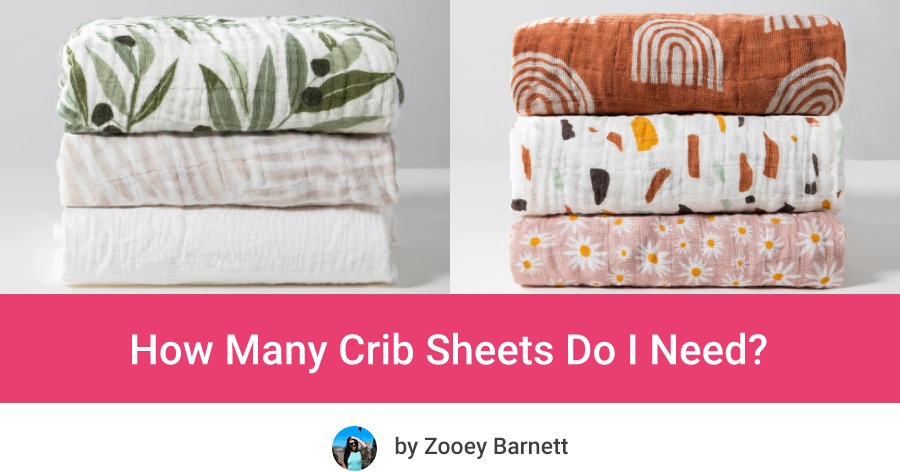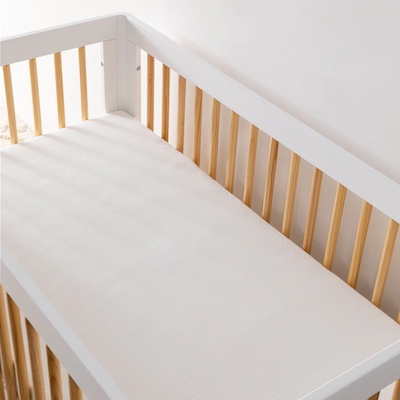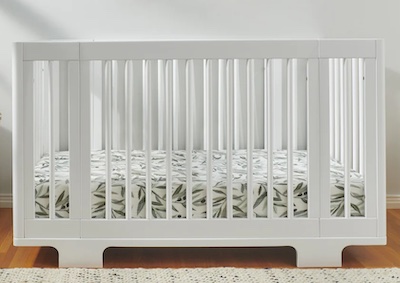
As a new parent, you may feel overwhelmed by the sheer number of items you need to buy for your baby. You may be trying to find a way to save money while still ensuring your baby has all the necessary gear.
One thing you may be wondering about is whether crib sheets are a must-have, and how many crib sheets you should actually buy.
In this article, we’ll go over the basics of crib sheets and provide some tips to help you decide how many fitted crib sheets you should register for.
So if you’re ready to learn more, let’s get started!
This article is not a substitute for medical advice.
Is A Crib Sheet Necessary?
Yes, a baby crib sheet is absolutely necessary! Not only will it keep your baby comfortable and cozy, but it will also protect their delicate skin from any rough surfaces and help keep them safe.
The American Academy of Pediatrics (AAP) recommends that babies sleep on a firm mattress with tight-fitted sheet (no loose fabric that could wrinkle and creep up)1.
Safe sleep surface should be free from any loose bedding, pillows, blankets, bumpers, and soft objects like toys. Crib sheets are an essential part of creating a safe sleep environment for your baby.
How Many Fitted Sheets For Crib Do I Need?
This is the question that many new parents have when they create baby registry: “How many crib sheets for I need for my baby?“.
You need to make sure that you have enough fitted sheets to keep your baby’s crib comfortable and clean.
For newborn or infant, you need 5-7 tight-fitted sheets for crib. This will ensure you always have a spare sheet, when a diaper blowout or spit-up happens, and you won’t have to wash the crib sheet everyday. This amount of crib sheets will be enough, even if you need to change the sheet every day.
As your child gets older and accidents like that happen less often, you may need 3 crib sheets (in case one is in the laundry, and one is on the mattress, you have one to spare).

Things to consider when deciding how many crib sheets you should register for:
-
Breathability Of The Fabric
If the fabric is less breathable (cotton vs. linen vs. modal) your little one may get more hot at night and sweat more. Then you may need to change crib sheet more often.
If your baby has some skin conditions (like eczema or cradle cap), you will be also changing crib sheets more frequently, to prevent germs and bacteria buildup which could trigger breakouts. It is also extremely important to choose the right fabric of the sheets especially for babies with eczema.
-
Accidents
The crib sheet will soak up all those unwanted liquids: sweat, pee, spit ups, formula or breastmilk, and even poop (yes, diaper blowouts will happen)!
You need to have a few fitted crib sheets to ensure you always have a spare one, in case you need to change it in the middle of the night after baby’s diaper leaked.
You don’t want any bacteria or mold to buildup on baby’s sheet or the mattress so you need to change the sheet immediately in case of accidents like this.
-
Climate
The climate that you live in, and the temperature in your house, have an impact on how many fitted sheets you need for your baby’s crib. If you live in a warm climate, you may need more fitted sheets, because your little one may sweat more at night.
You may need to change the sheets more frequently, to ensure your baby’s sleeping surface is clean, fresh and cool.
-
How Often You Do The Laundry
How often you do the laundry will impact how many crib sheets you should buy. If you don’t want to make the laundry everyday, you will need more crib sheets.
Look for crib sheets that are easy to wash – choose only the ones that are machine-washable.
Also, make sure to get good quality crib sheets that will last through multiple washings.
Keep in mind that with frequent washing the sheets may quickly wear out and you may need to replace them more often.
-
Baby May Get Sick
Of course this is not something any parent would want, but you do need to take this into consideration – your baby may get sick. This means more sweating, and possibly vomiting. Besides, you don’t want you little one to sleep on wet surface full of bacteria and germs!
Little baby’s have weak immune system (because it’s still developing), that’s why they may get sick pretty easily. And that’s why you need to have a few extra sheets!
-
Where Will Your Baby Sleep
How many fitted crib sheets you will need, also depends on where will your baby sleep: only in their crib, or also in a pack n play during weekends at grandparents home? You will need tight-fitting sheets for all mattresses your little one will be sleeping on.
How Often Should I Change Crib Sheets?
Lots of new parents wonder: how often to change crib sheets?
I recommend that you change your crib sheets every two to three days, or at least once per week.
This helps to keep your baby safe and comfortable, as it prevents the accumulation of bacteria and allergens.
If your baby spits up or has an accident like diaper blowout, or if the sheets become soiled, change them right away.
Additionally, if your baby is particularly sensitive to temperature, you may find it helpful to change them more frequently.
Additionally, check the mattress for any wet spots. You don’t want any germs or mold to grow on the baby’s crib mattress!

How Many Crib Mattress Covers Do I Need?
You will need at least 2-3 crib mattress covers for your baby’s mattress. It is important to have a waterproof cover to protect the mattress in case of any accidents or spills.
Of course the crib sheet will soak up some of these unwanted liquids like breastmilk, urine or poop, but they will definitely get through the fabric and may soil the mattress!
Waterproof mattress cover can also protect the mattress from dust mites, bed bugs, germs, and other allergens. This is especially important for babies who have allergies or sensitive skin.
In addition, a waterproof mattress protector can provide an extra layer of protection if your baby is a heavy wetter and the diaper may leak during the night.
In case of an accident like that you can simply take it off, toss it in the washing machine, and baby’s mattress will be saved!
Finally, if your baby gets sick with a cold or flu, a crib full-size mattress cover can help keep the mattress clean and free of germs. This can prevent your baby from getting sicker and can help keep your baby comfortable while they are recovering.
How To Choose The Best Crib Sheets? – Things To Consider
So you already know how many crib sheets you need to register for. Now it’s time to find out what are other important factors you need to consider when purchasing crib sheets.
Choosing the best crib sheets for your baby is an important decision since they will spend a lot of time in their crib, and the fabric may either trigger or help to soothe any skin irritations! Besides, choosing the right tight-fitted crib sheets plays important factor for baby’s safety and SIDS prevention!
1. Size Of Baby Crib
It is essential to ensure that you get the right size sheets for your baby’s crib. Measure the size of the mattress before you purchase the sheets. You don’t want them to be too small or too big for the mattress.
The snuggle fit is very important because any loose fabric that can creep up poses a risk of suffocation and increases the chances of SIDS!
Keep in mind that sheets for full-sized cribs and mini cribs differ a lot and they are not interchangeable. Pack and plays have thinner mattresses, which means you cannot use pack n play sheet them on crib mattress or the other way around! Always choose the right size of sheets – designed for your baby mattress size to ensure secure and tight fit.
It is important to make sure that baby’s sheets fit the mattress snugly and securely. Look for sheets that have elastic bands around the edges and that have deep pockets to ensure that the sheets stay in place.
What Size Bedding Do I Need For A Crib Mattress?
If you have a standard-sized crib, the mattress has a size between 51 ⅝ to 53 inches in length and 27 ¼ to 28 inches in width, with thickness up to 6 inches (make sure to measure your baby’s mattress anyway!). Usually sheets for standard crib mattress have dimensions: 28″ x 52″, with 8″-9″ deep pockets to fit 5″-6″ thick mattresses.
Keep in mind that in accordance with AAP recommendations for creating safe sleeping environment for your little one, you don’t any bedding, except for snuggly fitted crib sheet.
What Size Of Sheets Do I Need For A Mini Crib Mattress?
Mini crib is smaller than regular crib, and measures usually 24 inches in width and 38 inches in length. Look for mini crib sheets that are specifically designed to fit this size of a mattress (check the exact dimensions of your mini crib mattress!).
I don’t recommend using standard baby’s crib sheet on mini crib mattresses because there’s too much of a difference in size and there will be a lot of fabric excess, which according to AAP poses threat to baby safety and increases risk of suffocation.
What Size Of Sheets Do I Need For Pack N Play Mattress?
Pack N Play mattresses may differ in size, but most of them measure 37.5″ by 26″, and have 1″-1.5″ thickness. If your little one will also sleep in the portable pack n play, you need sheets that are designed specifically for this size of mattress.
Your baby’s crib sheets will not fit pack n play mattress! They will be too big, because full-size crib has larger and thicker mattress.
Don’t use standard baby crib sheets on pack n play mattress because there will be too much fabric excess that can creep up around baby’s mouth and increase the risk of SIDS.
2. Fabric
Be sure to choose a fabric that is soft and breathable, as this will help to keep your baby comfortable and cool.
The best fabrics for baby’s crib sheets are: organic cotton, linen, Tencel modal.
Look out for hypoallergenic baby’s sheets, especially if your baby has any allergies or hypersensitive skin. This way you can reduce the risk of triggering baby’s skin irritation or discomfort.
3. The Season You Baby Is Arriving
If your baby is due during a warmer season, you may want to look for sheets that are lightweight and breathable (made from linen or modal).
However, if your baby is due during a cooler season, you may want to opt for warmer organic cotton sheets.
The purpose of this article is informative. It’s not a substitute for professional medical advice or medical care. Remember: safety first! Consult your doctor/pediatrician in case of any doubts. The author of this article does not accept any responsibility for any liability, loss or risk, personal or otherwise, incurred as a consequence, directly or indirectly, from any information or advice contained here.
Resources:
https://www.healthychildren.org/

